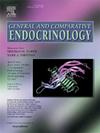No Breakfast? physiological effects of morning food deprivation in spotted munia (Lonchura punctulata)
IF 1.7
3区 医学
Q3 ENDOCRINOLOGY & METABOLISM
引用次数: 0
Abstract
Food is essential for an organism to meet its daily energy requirements. For this reason, animals show a highly motivated behaviour towards the acquisition of food. Food availability, however, is fairly irregular in nature as it is influenced by a number of environmental and ecological factors. Hence, food availability is a key factor in shaping the life history of an organism. In the present study, we tested the effects of timed food restriction on behaviour, physiology and hormone levels in Spotted Munia (Lonchura punctulata) subjected to a food availability for only four hours in the evening (Food restriction- FR). We also measured the indicators of stress to assess how birds responded to the restricted feeding schedule. The birds showed a significant change in their daily activity rest pattern where FR birds showed minimum movement during the time window when food was made available to them. Further, after two weeks, we found a lower body weight, plasma T3 and cort levels in FR birds, as compared to ad libitum controls. While the Heterophil/Lymphocyte ratio was higher, we observed a lower spleen weight and size in FR birds. These findings suggest that a predictable food scarcity led to behavioural and physiological adjustments in munia(s) reflective of an adaptive energy reallocation during food restriction.
没有吃早餐吗?缺食对斑文虫生理的影响
食物是生物体满足其日常能量需求所必需的。因此,动物对获取食物表现出高度的动机行为。然而,粮食供应在本质上是相当不规律的,因为它受到许多环境和生态因素的影响。因此,食物的可获得性是塑造生物体生命史的关键因素。在本研究中,我们测试了定时食物限制对斑点文鸟(Lonchura punctulata)行为、生理和激素水平的影响,这些文鸟在晚上只有4小时的食物供应(食物限制- FR)。我们还测量了压力指标,以评估鸟类对限制进食计划的反应。这些鸟在日常活动休息模式上表现出显著的变化,在食物提供给它们的时间窗口中,FR鸟表现出最小的运动。此外,两周后,我们发现FR鸟的体重、血浆T3和皮质激素水平较低,与随意对照相比。虽然异嗜淋巴细胞/淋巴细胞比例较高,但我们观察到FR鸟的脾脏重量和大小较低。这些发现表明,可预测的食物短缺导致了文鸟的行为和生理调整,反映了食物限制期间适应性能量重新分配。
本文章由计算机程序翻译,如有差异,请以英文原文为准。
求助全文
约1分钟内获得全文
求助全文
来源期刊

General and comparative endocrinology
医学-内分泌学与代谢
CiteScore
5.60
自引率
7.40%
发文量
120
审稿时长
2 months
期刊介绍:
General and Comparative Endocrinology publishes articles concerned with the many complexities of vertebrate and invertebrate endocrine systems at the sub-molecular, molecular, cellular and organismal levels of analysis.
 求助内容:
求助内容: 应助结果提醒方式:
应助结果提醒方式:


